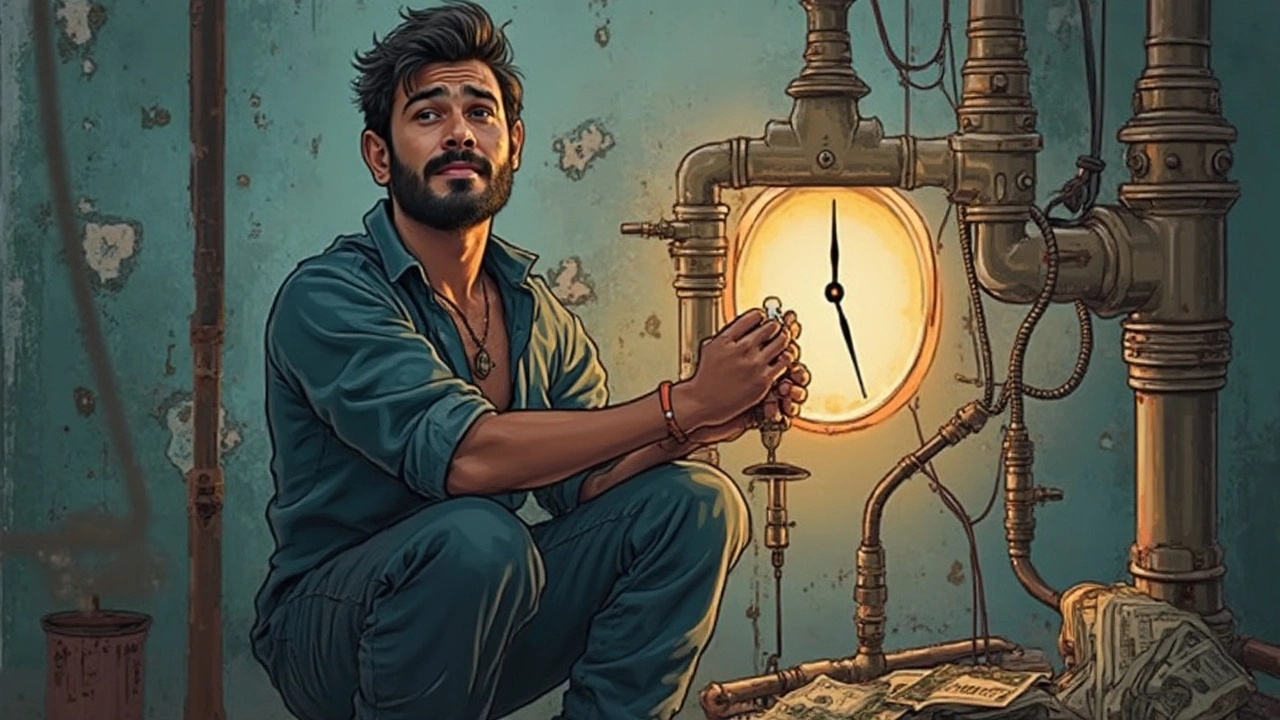Thinking about diving into a trade that doesn't just pay the bills but fills your wallet? Plumbing might be a solid bet. It's one of those fields that people don't often think about as a lucrative career, but it truly can be. Why? Well, because everyone needs a plumber eventually, whether it's for a leaky faucet or a completely new piping system.
Now, if you're on the fence about which route to take, picking the right course is crucial. Not all plumbing courses are created equal, and the one you choose could make a big difference in your earning potential down the line. You're not just learning how to fix toilets – you're gaining skills that are in demand worldwide.
- Why Choose Plumbing?
- Course Comparison
- Licenses and Certifications
- Salary Insights
- Tips for Maximizing Income
- Future Trends in Plumbing
Why Choose Plumbing?
So, why should you seriously consider a career in plumbing? For starters, there's this undeniable job stability. Everyone from homeowners to big businesses needs plumbers eventually, making it a career that is almost recession-proof. Even during economic downturns, people will have bathroom emergencies or need water systems repaired.
What's even more enticing is the earning potential. According to some recent stats, experienced plumbers in places like Sydney can earn upwards of AUD 80,000 a year. And that's before considering overtime or specialized jobs which can bump up that figure significantly. Not all careers let you start with such promising wages after a relatively short period of study and training.
Another big perk of diving into a plumber training course is the relatively low cost compared to a university degree. Many courses take a fraction of the time and money, without leaving you swimming in student debt. Plus, the hands-on experience is valuable. You'll actually get to apply what you learn directly to real-world situations, unlike some fields where you might scramble to find a job that fits your study.
Ever thought about work-life balance? On top of decent pay, plumbing offers flexible hours. You can choose to work for a company or go self-employed, setting your own rates and choosing your projects. Essentially, you craft your career the way you want it.
- High demand and job security
- Competitive wages with overtime opportunities
- Flexibility in work hours and environment
- A practical, hands-on profession
- Less educational duration and cost compared to traditional degrees
Course Comparison
Alright, so you’ve decided that a career in plumbing might just be your jam, but now you're staring at a bunch of plumber training options and scratching your head. How do you pick the one that’ll give you the best bang for your buck? Let's break it down.
The first option many consider is a community college program. These are often two-year deals, combining hands-on training and classroom theory. You’ll cover the basics, like piping systems, water heaters, and drainage, but they also throw in some math and safety protocols. Plus, your credits might transfer if you decide to go further in education.
If you're looking for speed, check out trade schools. These programs are usually shorter, around six to nine months. They focus on the practical stuff, getting your hands dirty and ready to jump into the workforce ASAP. Courses often touch on everything from residential plumbing to blueprint reading. Because they’re compact, you might find these more intense but also more direct routes into the job market.
One more route is apprenticeships. This is kind of like the pay-as-you-learn model. Yeah, you guessed it – you get paid while you learn alongside seasoned pros. It can take a few years, but the real-world experience is unbeatable. You’ll be out there fixing, installing, and learning the trade secrets that books don’t teach.
To give you a clearer picture, here's a quick overview:
| Course Type | Duration | Cost | Outcome |
|---|---|---|---|
| Community College | 2 years | Varies (often higher) | Diploma/Certificate |
| Trade School | 6-9 months | Moderate | Certificate |
| Apprenticeship | 2-5 years | Paid while training | Journeyman License |
Choosing the right course can affect your earning potential and career progression. Weigh the time, cost, and certification against what fits your lifestyle best. Get your hands wet – quite literally – and let each course guide you to a rewarding career in plumbing.
Licenses and Certifications
Alright, let’s talk about one of the most crucial aspects of becoming a plumber: getting licensed and certified. Having the right documents in your toolbox isn’t just about following the rules, it's about upping your game in the plumber training world. And trust me, it’s a competitive market out there!
Most places require a license to legally work as a plumber. In Australia, for example, you'll need to complete an apprenticeship and get registered. It doesn't just stop there. After gaining some experience, you might want to go for your Certificate III in Plumbing, which can lead to a bigger role in more complex projects.
Here’s a quick rundown of what you generally need:
- Apprenticeship: Typically lasts four years where you’ll learn the ropes under a skilled tradesperson. You earn while you learn – sounds like a win-win, right?
- Trade School: You’ll attend a registered training organization (RTO) for formal education. It covers off all those essential skills like installing water systems, reading blueprints, and even heating.
- Licensing Exam: After your apprenticeship and schooling, passing a licensing exam is usually the last official hurdle.
If you’re really in the mood to maximize income, look into additional certifications. Specialized certifications in green technology or gas fitting, for example, can boost your marketability. They show you're not just any plumber but a top-tier pro who’s got an edge in certain areas.
Plus, a licensed plumber with extra certifications often scores higher pay. It's kind of like when your mate has that limited-edition collectible – suddenly everyone wants it. The same goes for plumbing skills! Employers and clients are often willing to pay a premium for specialized knowledge.

Salary Insights
Ever wondered what the paychecks look like for plumbers? Well, it's more than you might think. In Australia, the average plumber makes a comfortable living, with wages varying depending on experience and location. If you're someone considering plumber training, this part might just be what you need to hear to make up your mind.
Starting out, a novice in the plumbing world can expect to earn around AUD 50,000 per year. But don't let that number fool you – there's potential for growth. Experienced plumbers with advanced skills and certifications can earn upwards of AUD 90,000. Specialized areas like commercial plumbing or gas fitting tend to pay even more.
"A skilled trade like plumbing offers stability and a reliable income, something many fields can't guarantee," says John Williams, a well-known industry expert and former president of the Plumbing Association of Australia.
Trade skills open doors to numerous opportunities. If you're thinking big, owning your own plumbing business could see your earnings increase significantly. Self-employed plumbers can charge between AUD 80 and AUD 130 per hour. Plus, offering emergency services or specialized skills often comes with a higher rate.
Here's a quick snapshot to give you an idea of what plumbers in different scenarios might earn:
| Experience Level | Average Salary (AUD) |
|---|---|
| Beginner | 50,000 |
| Mid-Career | 70,000 |
| Experienced | 90,000+ |
| Self-Employed | Varies (80-130/hour) |
No matter where you start in your plumbing career, the potential to build a financially rewarding profession is significant. Plus, the ability to set your own hours and the ever-growing demand for skilled plumbers make this trade an attractive option for many.
Tips for Maximizing Income
If you're pondering how to up your game as a plumber, and rake in the bucks, here's the lowdown on making your plumbing career as lucrative as it can be.
First and foremost, specialize. Believe it or not, specialization can be a goldmine. Think about areas like green plumbing or installing high-efficiency fixtures. These niches are trending, and they pay more. As people get more eco-conscious, they want those energy-saving options in their homes.
Building a solid reputation is another money-maker. Word of mouth is insane in this business. Do a stellar job, and folks will talk. Go the extra mile on service, and you'll have clients recommending you left, right, and center.
- Upsell Your Services: When you’re on a job, look around for other things that might need fixing. Offer maintenance tips and let your clients know what else you could help with. It's a great way to keep the cash flow steady.
- Get Licensed and Insured: Customers trust licensed and insured plumbers more. Plus, some high-paying gigs, like commercial or public contracts, won't even consider you without them. It's a credibility booster with tangible income benefits.
- Network, Network, Network: Ever thought of joining a local trade association? Or maybe hitting up networking events? Knowing the right people can land you opportunities that aren’t even advertised.
And hey, never stop learning. The tools, techniques, and even the building codes can change. Keeping your skills sharp is vital. Sign up for workshops, enroll in advanced plumber training courses, or grab online resources. It’s all about staying ahead of the curve.
Remember, maximizing your income as a plumber isn't just about working harder—it's about working smarter. By honing your craft and getting strategic about your approach, your bank account will thank you.
Future Trends in Plumbing
Alright, let's look ahead and see where the world of plumbing is headed. It's not just about wrenches and pipes anymore; the future looks pretty tech-savvy. One big shift is smart home tech. More homes are getting decked out with smart plumbing systems. These gadgets can monitor water usage, spot leaks before they cause damage, and even let you control your water heater with your phone.
Sustainability is another huge trend. People are getting more eco-conscious, and plumbers are using it to their advantage. Expect to see more demand for systems that conserve water, like rainwater harvesting and greywater recycling. Not only do they help save the planet, but such systems can also save homeowners a chunk of change on their water bills.
Then we've got the skills that are expected to boom, particularly those involving data analysis. Yes, you heard it right! Some smart plumbing systems collect loads of data. Plumbers who can interpret this data will have a competitive edge, diagnosing issues faster and offering more value to customers.
And let's not forget about the role of regulations and licensing. Governments are catching on to the importance of having skilled plumbers, especially in growing cities. Being up to date with certifications isn't just about following the law; it's about staying ahead in the market.
| Trend | Impact |
|---|---|
| Smart Plumbing | Increases efficiency and preventive maintenance |
| Sustainable Systems | Environmental conservation and cost savings |
| Data Skills | Improved problem-solving and service quality |
| Regulatory Awareness | Ensures compliance and market proficiency |
Finally, innovation is sparking in the plumber training courses themselves. More online and hybrid learning options are popping up, making it easier than ever to get qualified or upskill, even if you're already working. Jumping on these trends early gives you a significant leg up as plumbing continues to evolve. Staying informed and adapting is key!



